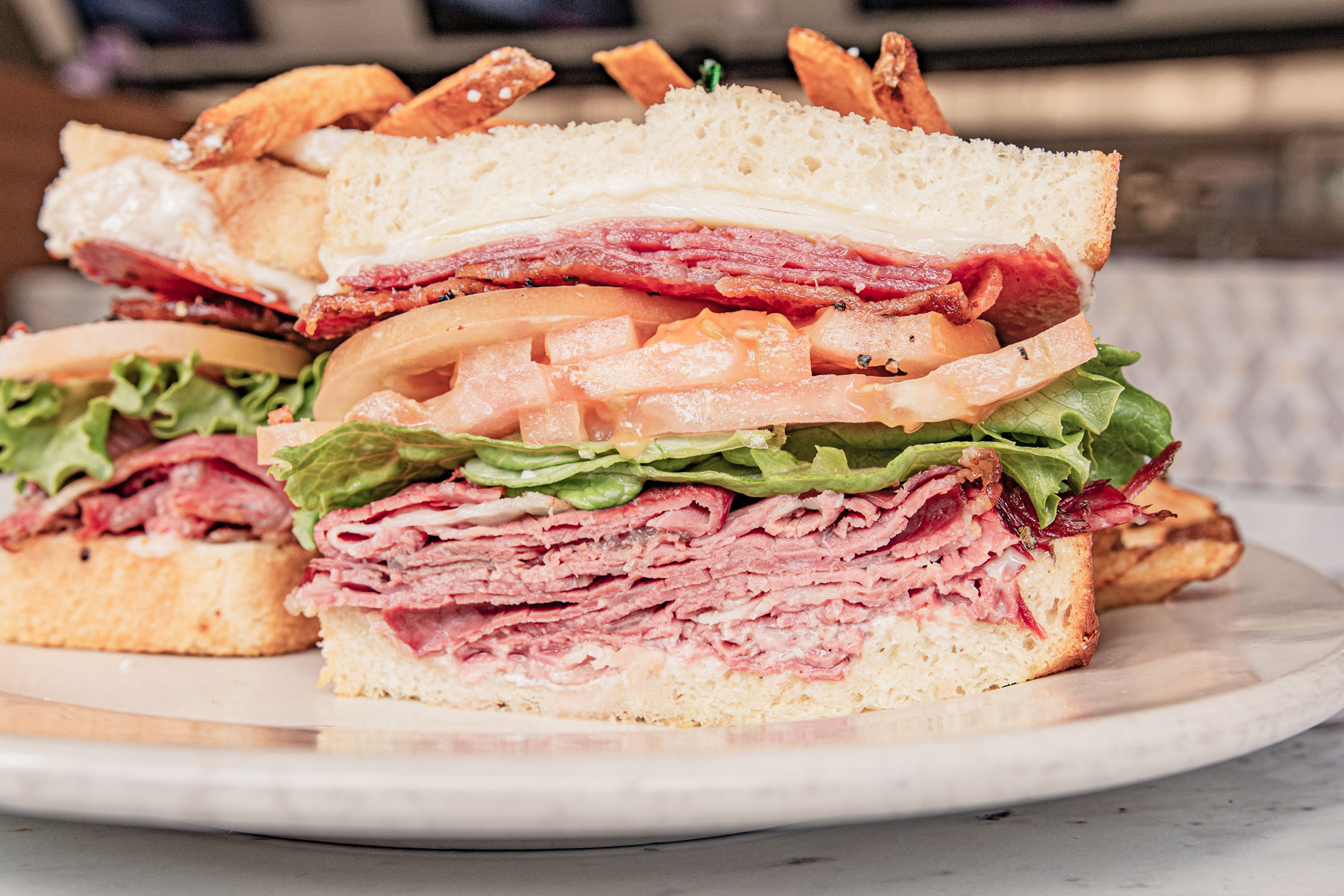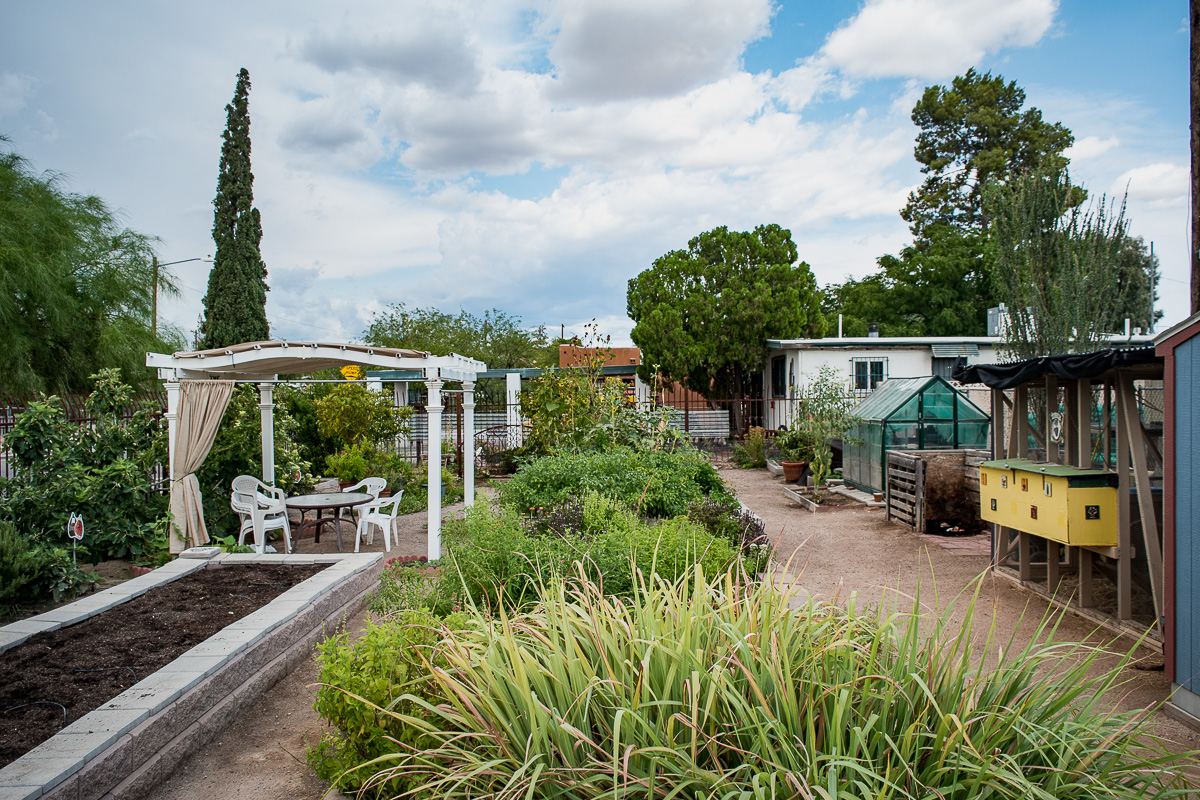
It can be tough for some residents of the 1.1-square-mile City of South Tucson to balance all the tasks necessary to achieve health. Many work several part-time jobs or struggle to find one. They might lack health insurance and reliable transportation, and struggle to pay for their basic necessities.
To top it off, they are situated in one of the U.S. Southwest’s “food deserts” — areas where healthy food, especially fresh produce, is hard to come by due to socioeconomic and geographic factors. As such, they tend to eat saltier, sweeter, fattier foods than their wealthier counterparts. It follows that, statistically, people who live in food deserts get sick more often than people who have access to fresh food.
On the whole, food desert dwellers generally don’t have as much time to exercise, the capacity to garden at home, nor much training in nutrition.
The Garden Kitchen, 2205 S. Fourth Ave., provides education, space, and resources to help with all of these things – and more – for free or at a low cost.
https://www.instagram.com/p/BmT7jrmDj6T/?taken-by=uagardenkitchen
The Garden Kitchen’s overarching goal is obesity prevention — obesity being a leading precursor to and symptom of unhealthiness. The Kitchen has taught more than 45,000 Tucsonans techniques and know-how that they can integrate at home to improve their overall well-being. From seed to table, The Garden Kitchen teaches everything from food budgeting to meal planning to shopping to gardening to cooking to exercising.
They are supported by local, state, county, and federal grants — as well as a couple of internal revenue generators, proceeds from which go back to the community. Pima County funds the building while the University of Arizona provides labor and other related costs. The Garden Kitchen is a cooperative extension of the College of Agriculture and Life Sciences. It partners with anywhere from 25 to 40 organizations to provide resources, education, guidance, and technical assistance for community members trying to make healthy choices.
The trifecta of skills that The Garden Kitchen offers is cooking and nutrition, physical fitness, and home gardening skills. Courses related to these skills are open to anyone interested and mostly occur on a drop-in basis.
Director Jennifer Parlin started with The Garden Kitchen in October 2010 at its location near the UA Campus Agricultural Center at the intersection of East Roger Road and North Campbell Avenue, and moved with the facility when it relocated its community center to its present South Tucson site in October 2012. Administrative offices are still at the former location.

Parlin wears plenty of hats around The Garden Kitchen, teaching any of the three types of classes. For example, she might teach a Zumba class at First Fit Saturdays, which are drop-in courses on the first Saturday of any month.
First Fit Saturday classes start at 9 a.m. Community members exercise for 45 minutes or so, then move into the center’s hands-on kitchen to learn three to five recipes, Parlin said.
After the hands-on cooking class, which takes place from about 10 to 11 a.m., participants head out into the center’s demonstration garden, where they learn home gardening skills until about 12:15.
Since the majority of South Tucsonans rent, not own, their homes, The Garden Kitchen mostly teaches container gardening. Container gardening represents a portable, manageable way for participants to produce their own organic fruits, herbs, and vegetables that they can incorporate into recipes they just learned to cook. And if there is extra food in the garden, they sometimes can keep that as well.
All the plants in the demonstration garden use little water. They are desert-adapted plants, like lemongrass, pomegranate, and summer squash (and there are some super friendly laying chickens to boot). The garden just acquired a grant for a 1,300 gallon water cistern that they use for fruit trees and select food crops, but they want community members to know that they can have a small garden — and resultant food — that requires little water expenditure. They can take compost from The Garden Kitchen and sometimes seeds, which are also available at several public libraries around town.
https://www.instagram.com/p/Bl-5V68jESa/?taken-by=uagardenkitchen
On Thursdays, Parlin might be leading the 7-8 a.m. Community Gardening Hour, which teaches various topics like irrigation, composting, harvesting, or seed collection.
If a community member wants to come in on Saturday for a cooking class — perhaps Asian Flavors or Knife Skills, both of which are coming up in September — they can pay a $55 fee for three hours of hands-on experiential cooking lessons from local chefs like Tom Kressler. He has been teaching at The Garden Kitchen for a little over a year, specializing in Italian cooking courses.
“It’s an honor to teach here,” Kressler said. “I like to see it succeed.”
https://www.instagram.com/p/Bi4swypDaPZ/?taken-by=uagardenkitchen
One hundred percent of the proceeds from the $55 community courses and other customized revenue generators, like the Kitchen’s new $25 cookbook, go back to the community programs.
Tucson has few cooking classes that are open to the community on a drop-in basis, but the others Kressler teaches, he said, are only demonstration courses that cost a lot more, not hands-on like this one.
The Garden Kitchen embraces a “teach a person to fish” mentality. Parlin said her rendition of success is to “empower the community with the skills and confidence to do these things at home,” easing at least a little bit the repercussions of living in a tiny community with little access to healthy alimentos.
The Garden Kitchen is located at 2205 S. Fourth Ave. For more information, visit thegardenkitchen.org or call (520) 621-0476.